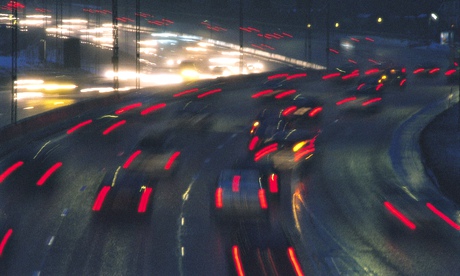
Transport is an extremely energy-intensive sector, and as with other areas like commercial or residential buildings, efficiency is vital if it’s to become sustainable. The cheapest, least damaging energy is that which is not used at all – hence the importance of promoting walking and pedestrian-friendly streets for the trips we don’t need a vehicle for.
We should encourage the modes that minimise wastage and pollution over the ones that mostly move air around while contributing high amounts of carbon emissions. Clearly, public transport, cycling and car sharing are more energy-efficient (and environmentally friendly) than single-occupancy car journeys. The signs of the former replacing the latter are good, in terms of public behaviour: bus and train journeys are on the rise, car use is peaking, and hundreds of local sustainable transport schemes are proving popular, effective and good value for money.
But unless there is a major change in government policy, the environmental impact of transport will only worsen. As Campaign for Better Transport reported in 2008, action must be taken to support measures such as travel plans for commuters, better information on travel options and integration of the planning of transport with other amenities to minimise the distance from A to B. Six years later, we’re still campaigning for most of these measures to be developed fully, and to stop funding cuts to public transport.
The government’s infrastructure bill, combined with the national policy statement for national networks which is also passing through parliament, would commit it to massive spending on a huge expansion of motorways, amounting to £15bn over the next five years. This is significant for energy consumption: it’s well-established that while expanding roads doesn’t necessarily solve our transport problems, it definitely does increase traffic. The latest Department for Transport statistics show that the only roads where traffic increased in 2013 were motorways, where a new wave of widening and “managed motorway” schemes were coincidentally completed.
Meanwhile, local authorities are being forced to cut support for vital bus services because of reductions in government funding. You only need to look at the difference between carbon emissions from cars compared with buses (almost 60% of emissions from road transport are from cars compared with 5% from buses) to see the importance of the transport choices we make. Money is tight, but our public services are currently wasting huge amounts by providing piecemeal transport to facilities such as hospitals and schools. If we pool funding spent on transport in the health, education and welfare sectors to spend on integrated, coordinated services we will see better accessibility at much better value.
We must finally lay to rest the myth that there is rising demand for new roads, and instead recognise the benefits of protected investment in locally-led sustainable transport schemes that will reduce car-dependency. We must learn from the successes of the Local Sustainable Transport Fund and enshrine both funding and power for local communities to cooperate on the green travel developments that work best for those who live and work in the area.
And it’s not just about passenger transport: while the vast amounts of freight that must be moved around the country are slowly shifting from HGVs to rail, the government must be clear and firm in developing better freight terminals and limiting the scope of remaining HGVs to pollute our roads.
Successes will remain isolated examples rather than the beginnings of a systematic move to sustainable transport unless government policy becomes more consistent and proactive. It wouldn’t take much – the ideas, technology and public will is there.
Two obvious and necessary actions need to be taken by the next government in order to maximise the huge potential of our transport network to improve its energy sustainability: invest in good-quality, affordable public transport and accept the fact that new roads create new traffic.
James MacColl is head of campaigns at Campaign for Better Transport
This article is part of the Guardian’s #bigenergydebate series. Click here to find out more about this project and our partners.

